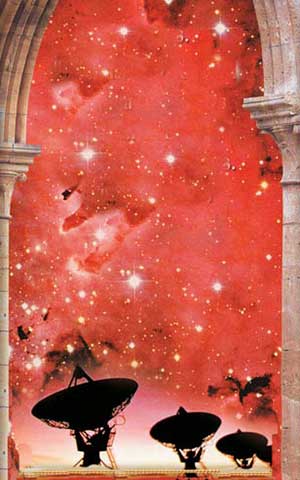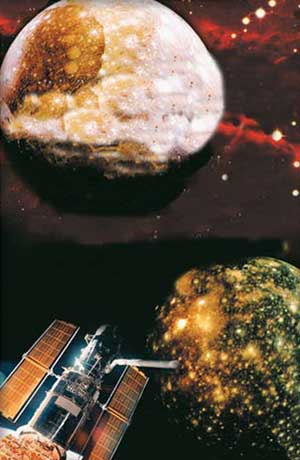 |
In its April 12, 2003, edition, The New York Times carried an article by the famous astrophysicist Paul Davies entitled "A Brief History of the Multiverse." In this article, Prof. Davies attempts to defend the claim that there may be an infinite number of universes, and that our universe just happened to be suitable for life, which is the latest argument in which materialist thinkers have sought refuge in the face of the finely tuned design in the universe.
We first need to briefly set out why materialists developed such an argument. For thousands of years, the divine religions and philosophies that accept the existence of God have maintained that there is purpose and design in the universe, whereas materialists—those who claim that nothing exists apart from matter—have rejected the existence of purpose and design. A series of astronomical and physical discoveries in the twentieth century, however, revealed that the design in the universe was so clear as to be undeniable.
 |
These discoveries revealed that at the moment the universe began, all variables—from the speed of the Big Bang to the strength of the four fundamental forces, from the structure of the elements to that of the Solar System in which we live—were exactly what was required to support life. This tremendous discovery, which scientists in the 1970s announced and described as the Anthropic Principle, clearly invalidated the materialist argument for non-design.
In his article in The New York Times, Paul Davies summarizes this fact and admits the inevitable conclusion; the existence of God:
Why is nature so ingeniously, one might even say suspiciously, friendly to life? What do the laws of physics care about life and consciousness that they should conspire to make a hospitable universe? It's almost as if a Grand Designer had it all figured out.
However, although regarding the design in the universe as proof of the existence of God, Prof. Davies rejects this fact. In order to account for the origin of the design in the universe, he resorts to the multiverse theory, the last refuge, as we have already seen, of the materialists.
 |
"Among His signs is that heaven and earth hold firm by His command." |
According to this theory, the universe we live in may be only one of an infinite number of universes comprising a very much larger "multiverse." In the materialists' view, it is quite normal for one or some of so many universes to be suited to life.
Yet is there any scientific evidence to support this theory?
No. None at all. It is nothing more than speculation, a scenario cast upon the waters.
The interesting aspect of Prof. Davies' article is that he attempts to give the impression that there is in fact a large quantity of important evidence in favor of the multiverse theory. The newspaper's spot caption summarizing the article is directed to just that end:
This idea of multiple universes, or multiple realities, has been around for centuries. The scientific justification for it, however, is new.
Anyone seeing these introductory sentences without going on to read the whole text may well imagine that the multiverse theory is based on concrete scientific proof and that Prof. Davies' article goes on to mention it. However, quite the opposite is the case: There is no such evidence and in fact the author says not a word about this new scientific evidence, which he would happily speak of, if it existed.
On the contrary, there are admissions in Prof. Davies' article that the multiverse theory is only speculative. According to Prof. Davies, the multiverse theory has been arrived at "by imagining." Moreover, he says in reference to the theory that "credibility reaches a limit" and that it "more and more must be accepted on faith."
In short, Prof. Davies' and all other materialists' interest in the multiverse theory stems from personal preference rather than scientific proof. The starting point of that personal preference is their unwillingness to accept that the universe is the work of a Creator. Paul Davies states this fact in his article, claiming that any account based on saying "God made it that way" is not "satisfying" for a scientist.
This question of "satisfaction" or the lack thereof is actually the starting point of materialistic science. This view of science takes as its aim the denial of the existence of God in accounting for nature and the universe. As Benjamin Wiker has set out in considerable detail in his important book, Moral Darwinism: How We Became Hedonists, this intention has always lain behind the attempt to build a science that ignores the existence of God, which stretches from Epicurus to Charles Darwin and contemporary materialists. Materialists are desperately trying to develop and prove theories that deny the existence of God, not because science demands them, but because their worldviews and philosophies do.
Science itself, on the other hand, insistently and powerfully reveals the truth that materialists seek to ignore—that the universe is full of evidence of the Creator Who created it from nothing and so marvellously designed all its content.
 |
"God created the heavens and the earth with truth. There is certainly a Sign in that for the believers" |
The multiverse theory is one of the theories put forward in order to deny that truth, and is very definitely unfounded. The lack of any scientific evidence for the theory, as Prof. Davies himself admits, reduces it to the level of a belief—an unsubstantiated belief. Moreover, it is deceptive for materialists to put forward such objections as "you believe that God created the universe, we believe in many universes"—in other words, to suggest that there is a sort of "equivalence" here—because:
The rational explanation for the design in the universe is an intelligent designer. When you see a statue, you realize that there must also be a sculptor. An argument such as "Since there are infinitely many stones in the universe, this one just happened to take shape by chance," is of course quite irrational. In line with the logical rule known as Ockham's razor, which states that the simplest explanation of something is the one that ought to be accepted, the origin of the fine tuning in the universe is to be explained in terms of design rather than chance. (For details, see Harun Yahya's The Creation of the Universe, Al-Attique Publishers, Canada, 2001.)
There is a great deal of scientific evidence for the existence of God beyond just the fine-tuning in the universe. Like other materialists, Paul Davies believes that Darwinism has resolved the problem of the origin of living things, or else consoles himself with that assumption. The fact is, however, that Darwinism is now a discredited theory, and that it has been powerfully proven that there is intelligent design in the origin of living things. This is a scientific demonstration of the fact that, as well as creating the universe with flawless balances and design, God also intervenes in the universe which He has created. (For further details, see Harun Yahya's Darwinism Refuted.)
 |
"It is God Who made the earth a stable home for you and the sky a dome, and formed you, giving you the best of forms, and provided you with good and wholesome things. That is God, your Lord. Blessed be God, the Lord of all the worlds." |
There is considerable evidence for the existence of God beyond the positive sciences. Discoveries in many areas such as human psychology, the evidence for the existence of the human soul, the divine texts, and the miraculous information in the Qur'an, the last divine text, demonstrate the existence of God and the fact that He created man and showed him the true path by way of religion. (See Harun Yahya's article "The Fall of Atheism," http://harunyahya.com/en/works/3347/the-fall-of-atheism)
Materialists, on the other hand, are unable to find any other solution in the face of the increasingly powerful evidence mounting against them than to dream up new speculative theories—just like Paul Davies, who sets out by speaking of "new evidence for the multiverse theory," but who is unable to offer any evidence at all.
What Prof. Davies needs to do is to re-evaluate the scientific findings regarding the origin of the universe, not in the hope of finding a "satisfying" conclusion from the point of view of materialist prejudice, but in the hope of finding the ultimate truth. Then, he might see the truth of creation, which has been under his very nose all along, and finally grasp the existence of God, his own Creator and the Creator of all mankind.